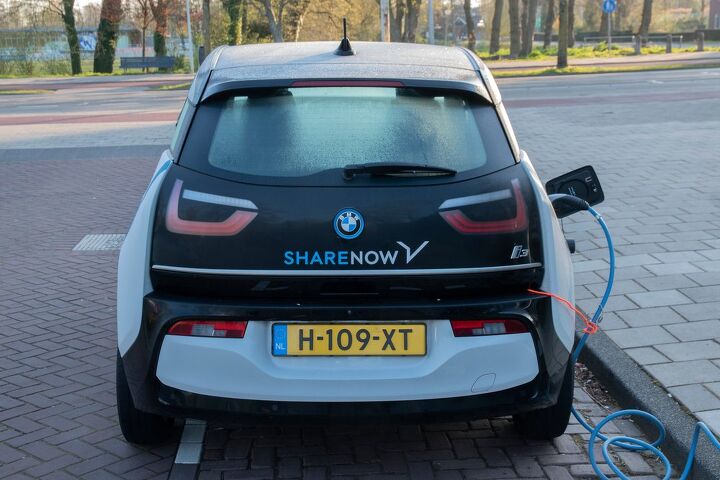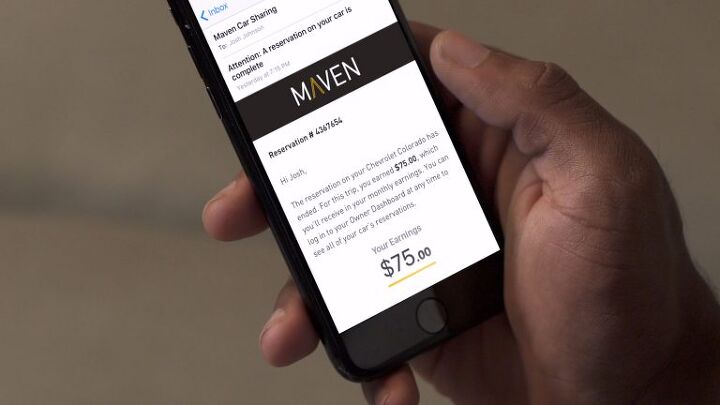#CarSharing
BMW & Mercedes Offload Car Sharing Business
BMW and Mercedes-Benz are dumping ShareNow — their jointly managed car-sharing businesses — and Stellantis will reportedly become the recipient. Effectively a merger of BMW’s DriveNow and Mercedes’ (technically Daimler AG’s) slurry of similar services that were rolled into car2go, ShareNow’s individual components have spent the last decade trying to figure out which markets would embrace app-based, roadside rentals charging by the minute and which would reject it.
Indianapolis Muses Solution to Failed EV Program, Asks for Help
Indianapolis’ electric car-sharing program, BlueIndy, died in May. Failed green initiatives are fairly common these days, but they remain an important exercise in finding out what works and what doesn’t in order for progress to be made. Unfortunately, that doesn’t preclude host cities from having to deal with the aftermath — and Indiana’s capitol now needs to decide what’s to be done with the EVs and their stations.
BlueIndy lasted four years, with the company announcing it was forced to cease operations because it “did not reach the level of activity required to be economically viable.” The plan was to provide an eco-friendly alternative to car ownership, though Indy citizens seemed less eager than their leadership. This has left the city with dozens of small, relatively new EVs waiting to be crushed and roughly 90 charging stations it has no idea what to do with.
Naturally, it’s asking for advice.
An Experiment in Error? Maven Bites the Dust, GM Lauds 'Insights' Gained
The great General Motors ride-sharing experiment is over. At least for now. Maven, which hit parking lots in 2016 and eventually expanded into the nation’s driveways, was GM’s attempt to put its vehicles to work, rather than sell them to retail or fleet customers like some kind of dinosaur.
For a fee, users could access the GM-owned fleet of Maven products to perform random driving tasks. Short trips, mainly, in the absence of an Uber or Lyft ride or participation in a more formal car-sharing agreement. Tap that app, find the car, unlock it, and drive off. Abandon somewhere after you’re done.
Well, that’s what GM just did with Maven.
Survey: EV Interest Varies Wildly Between Nations, Ditto for Shared Ownership
If you follow the automotive industry at all, you’re undoubtedly aware that the United States is a region that hasn’t quite embraced automotive electrification on the same level as the rest of the developed world. Americans travel longer distances and have particular tastes, making EVs more popular in places like Europe and China. It also hasn’t passed the same sweeping regulations to ensure their advancement.
Whatever the cause, a new survey from London-based OC&C Strategy Consultants attempted to tabulate the disparity — asking 2,000 consumers (apiece) in the U.S., China, Germany, France and United Kingdom between March and April of 2019.
Their findings? Only about half of the surveyed Americans felt EVs were worth their consideration as a potential successor to their current ride. In China, 90 percent said they would seriously consider buying electric. Between 64 and 77 percent of respondents in Europe said the same (depending on country).
Car2Go Thieves Test Car-sharing Vulnerabilities
After suspending manual background checks to encourage fresh users in April, Daimler subsidiary Car2Go found itself with a problem in Chicago — its new customers were stealing cars by the gross.
On the April 15th, the ride-sharing service notice an uptick in usage that was well above the norm. However, as the day progressed, the company found that a lot of its higher-end vehicles weren’t coming back. Instead, they were convening on Chicago’s West Side. Two days later, the Chicago Police Department announced that it had been notified by Car2Go that some of the company’s vehicles may have been rented by deceptive or fraudulent means and was officially on the prowl for justice.
The Latest Mobility Breakthrough: a 'Fiat'
Lime, the company that sent electric scooters driven by traffic-unaware short-term renters to every corner of the continent, has a new mobility plan. While e-scooters and bikes are great for travelling short distances in the city (a fact many pedestrians and motorists would disagree with), sometimes you need to go up hills, or perhaps travel further — and with more people — than a two-wheeled conveyance would allow.
What to do? Call on an automotive brand that’s desperate for sales, that’s what. Oh, and those aren’t Fiat 500s. They’re LimePods.
GM's Eyeing Your Tool Shed, Not Just Your Garage, for Revenue
If you’re a GM owner in one of three American cities, you’re already able to put your vehicle on the short-term rental market. Now, imagine if you could do the same for your lawnmower. And that kid of yours hardly ever uses his skateboard anymore. What about those rollerblades you picked up in 1992 but mothballed due to the stigma? Everything’s a possibility in this age of micro-mobility and peer-to-peer sharing.
General Motors’ Maven mobility arm, which started off renting company-owned vehicles to cash-strapped taxi haters before launching a pilot with privately-owned cars and trucks, now has its eye on your yard care appliances — and who knows what else.
Toyota Announces 'Beloved' New Subscription Service, Annoyingly Claims Transformation Into 'Mobility Company'
Cadillac recently made the choice to suspend its vehicle subscription service, claiming the operation hit some costly roadblocks. That’s been our beef with most subscription programs as well, only on the consumer side of the coin. Customers typically end up paying significantly more for access to a fleet of vehicles that, individually, would have been much cheaper to simply buy or lease. Still, the intended draw isn’t saving money, it’s convenience — most subscription services allow customers to swap between select models on the fly, baking in both insurance and maintenance fees.
While these subscription services have been limited to premium nameplates thus far, Toyota wants to try its hand and see how things play out for a mainstream manufacturer.
Day-rate Disruptors: Rental Agencies Sure Seem Excited About Mobility
Car rentals have evolved rather dramatically in the new millennium. While you can still reserve over the phone before walking into an office to pick up the manager’s special for the agreed upon timeframe, alternatives are many. ZipCar transformed how some people get around an urban environment by allowing customers access to an array of automobiles at hourly rates. Seeing its potential, Avis acquired the company in 2013, expanding its function to include a less stringent return policy via ZipCar Flex.
Meanwhile, Enterprise has its own short-term rental services. Recently, the company has been on a kick to purchase as many mobility firms as it can. Hertz, which has been a little slower to dive into mobility culture, does offer alternatives to traditional rentals in specific markets. It also announced a new strategic partnership with the tech firm Aptiv last July to start testing autonomous fleets this fall.
This, of course, is all taking place in an era where carmakers are launching fleets of their own while attempting to rebrand themselves as data and mobility companies. But surely these rental agencies are just hedging their bets and trying to adopt new tech to better serve their customers. They’re not about to adopt the same tired rhetoric, are they?
Trademark Foreshadows Launch of GM Subscription Service 'DriveScription'
While we’ve bashed them for being one of the most expensive ways to acquire a vehicle, automotive subscription plans have becoming increasingly popular among premium nameplates. General Motors already has one exclusively for Cadillac but it appears that it’s setting up another for its less illustrious brands.
Late last month, the automaker filed a trademark application to register the name “DriveScription” with the United States Patent and Trademark Office. The document clearly states that the term will be used in association with the Goods and Services categories of automotive subscription services, rental services, and vehicle sharing. Considering that Maven already handles most of the short-term rental and ride-sharing aspects of GM’s new mobility services, DriveScription is almost certain to be the mainstream equivalent to Book by Cadillac.
Thinking of Getting a BMW Subscription? Expect to Mercifully Pay Less
BMW is trimming some of the fat off its car subscription program after the media collectively realized that paying twice what you would on an average lease didn’t constitute a good deal. Frankly, most car subscription services that exist right now are an incredibly poor value. Bavarian Motor Works was the rule, not the exception.
However, most of these programs are in their infancy and cater to wealthier individuals who get a kick out pestering automakers to submit to their whims by occasionally delivering a new vehicle. It was presumed that those lofty fees would come down as competition ramped up and mainstream automakers entered the fray. That, along with some public criticism of the subscription model, seems to be helping push automakers away from astronomical prices.
That’s not to say the German manufacturer is suddenly offering a bargain alternative to leasing. But if you love the idea of having a car for every occasion and don’t want to deal with insurance agents, Access by BMW has become more affordable.
Unsubscribed: The Problem With Car Subscription Services
Automakers are trying everything under the sun to turn a larger profit these days. Building and selling cars is no longer enough. Manufacturers now offer data plans, rental services, lifestyle products, and much more. One of the newest additions to their collective portfolio is the subscription plan — which yields customers a vehicle, insurance, maintenance, and other perks for a monthly fee.
However, as the concept is preparing to enter the mainstream market, the value of such programs have been called into question. While subscription services look like one-stop shopping, often providing users with the ability to swap models throughout the year, their cost effectiveness comes into doubt when one examines the bottom line. We’ve been skeptical for a while but Edmunds recently crunched the numbers to find out for sure.
Volvo Launches 'M' Mobility Brand, BMW Likely to Become Perturbed
Having already launched the Care by Volvo subscription program, the Swedish-Chinese automotive brand wants to continue cramming feathers into its cap. It’s now launching a new mobility brand that sounds very similar to car-sharing services offered by numerous automakers and rental firms.
There could be an issue with the naming strategy, however. Volvo wants to call the company M, which is a letter of the alphabet that’s of particular interest for BMW. In case you’ve been in a coma for the last forty years, the German automaker has used the letter M (for Motorsport) to denote its performance division and affixes it to everything in its lineup with sporting pretensions. While it probably can’t claim ownership of all things relating to the mark, it’s definitely not going to be thrilled to see Volvo using it.
GM Preparing to Rent Your Car: Report
Only if you choose to, it seems. After launching its Maven ride-sharing service in numerous U.S. cities, as well as Canada’s largest population center, sources claim General Motors wants to expand the service to privately owned vehicles.
In other words, you’ll be able to make your own GM car available via the automaker’s app-based Maven service, generate income from short-term renters, while GM takes part of the cut. If the plan goes ahead, let’s hope your renters aren’t as slovenly as these ones.
Former Banker Wants Wealthy Individuals to Share Racing Cars Via New App
The former digital chief of Credit Suisse, Marco Abele, intends to introduce an app allowing wealthy individuals to share ownership of experiential assets — things like vineyards, works of art, and even fine automobiles.
Abele calls the digital service a “blockchain-based investment platform,” which is just a bullshit businessman buzzword way to say there will be a transaction ledger. By keeping things transparent, the group’s owners can ensure nobody gets financially burned when someone drives a shared $300,000 Lamborghini Huracan Super Trofeo Evo into a barricade.
At any rate, it sounds like communism for rich people.






























Recent Comments